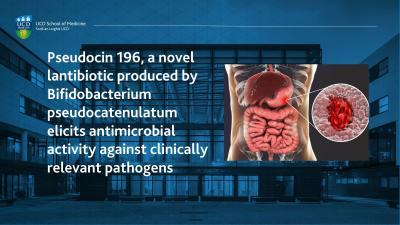Great work from the multidisciplinary Microbe Mom programme. Congratulations to UCD School of Medicine’s Dr Rebecca Moore and Professor Fionnuala McAuliffe from UCD Perinatal Research Centre, School of Medicine, University College Dublin, National Maternity Hospital and their research collaborators from University College Cork and Teagasc Food Research Centre on their recent publication in GUT MICROBES of their paper Pseudocin 196, a novel lantibiotic produced by Bifidobacterium pseudocatenulatum elicits antimicrobial activity against clinically relevant pathogens.
Congratulations to UCD School of Medicine’s Dr Rebecca Moore and Professor Fionnuala McAuliffe from UCD Perinatal Research Centre, School of Medicine, University College Dublin, National Maternity Hospital and their research collaborators from University College Cork and Teagasc Food Research Centre on their recent publication in GUT MICROBES of their paper Pseudocin 196, a novel lantibiotic produced by Bifidobacterium pseudocatenulatum elicits antimicrobial activity against clinically relevant pathogens.
Bacteriocins are broad or narrow-spectrum antimicrobial compounds that have received significant scientific attention due to their potential to treat infections caused by antibiotic-resistant pathogenic bacteria. The genome of Bifidobacterium pseudocatenulatum MM0196, an antimicro-bial-producing, fecal isolate from a healthy pregnant woman, was shown to contain a gene cluster predicted to encode Pseudocin 196, a novel lantibiotic, in addition to proteins involved in its processing, transport and immunity. Following antimicrobial assessment against various indicator strains, protease-sensitive Pseudocin 196 was purified to homogeneity from cell-free supernatant. MALDI TOF mass spectrometry confirmed that the purified antimicrobial compound corresponds to a molecular mass of 2679 Da, which is consistent with that deduced from its genetic origin. Pseudocin 196 is classified as a lantibiotic based on its similarity to lacticin 481, a lanthionine ring-containing lantibiotic produced by Lactococcus lactis. Pseudocin 196, the first reported bacteriocin produced by a B. pseudocatenulatum species of human origin, was shown to inhibit clinically relevant pathogens, such as Clostridium spp. and Streptococcus spp. thereby highlighting the potential application of this strain as a probiotic to treat and prevent bacterial infections.
To read the full paper visit: https://t.co/MQSz4BRR2E